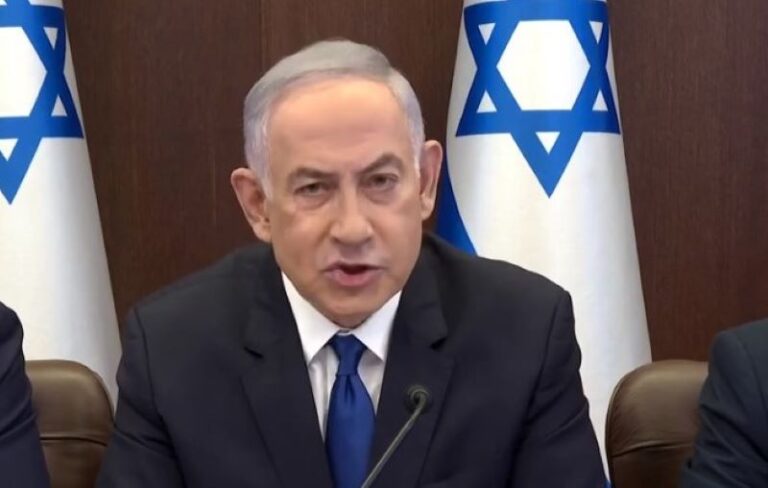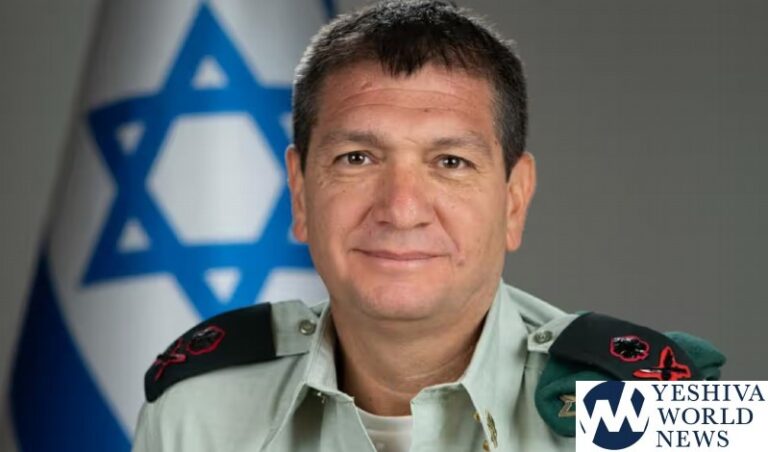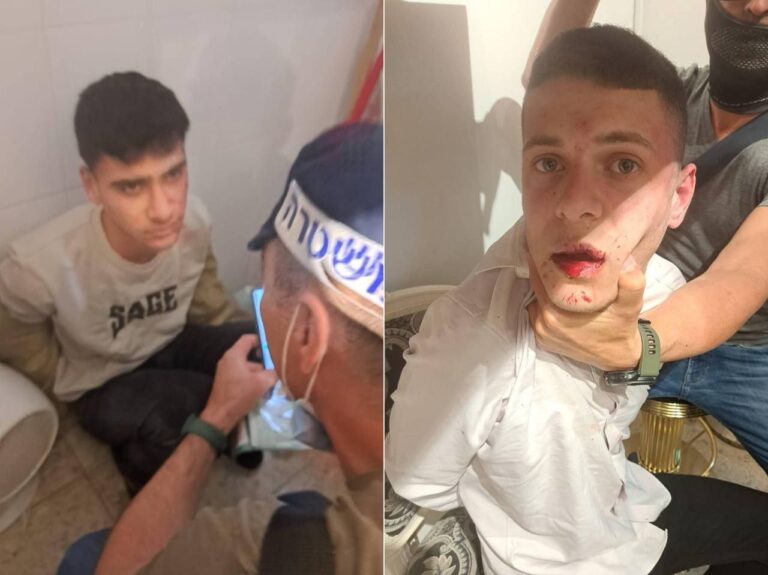 [By Rabbi Yair Hoffman]
[By Rabbi Yair Hoffman]
The horrific tragedy in Har Nof this past Tuesday should cause us, perhaps, to rethink the manner in which we observe a certain halacha. It is not that halacha should change. Rather, changing circumstances in Israel leads us to the application of different aspects of halacha. There is an Intifada happening now, and this creates new realities in Shuls, schools, and Yeshivos.
The Talmud (Brachos 54b) tells us that Tefillah, prayer – lengthens a person’s life. A long knife or sword, on the other hand, shortens a person’s life. The Orchos Chaim cites the Maharam of Rottenberg that based upon this dichotomy, a Jew should not bring a sword or long knife into shul. The Shulchan Aruch (OC 151:6) rules in accordance with this view, although some Poskim have told me that this ruling of the Shulchan Aruch is really more of a piece of ethical advice rather than Psak Halacha.
The Gemorah in Sanhedrin (82a) cites the fact that Pinchas arose from the congregation and he took a spear in his hand. The Gemorah explains that from here we see that a weapon is forbidden in the Beis haMidrash.
The question is, does the current situation in Israel warrant that a number of well-trained members of shuls and Yeshivos should arm themselves with guns at this point?
This author believes that there is no question that it should. And that the halachos found in OC 151 are for America, but not for Israel in the midst of an Intifada.
Here is why.
First and foremost, the issue of Pikuach Nefesh supersedes the halacha of not bringing a weapon into shul. The Torah tells us v’chai Bahem – and we shall live by the Torah – not die by them.
Secondly, having armed individuals in shul will save lives, and saving life is a fundamental Mitzvah. What is the source of this Mitzvah? The verse in Parshas Ki Taytzai (Dvarim 22:2) discusses the Mitzvah of Hashavas Aveida – returning an object with the words, “Vahashaivoso lo – and you shall return it to him.” The Gemorah in Sanhedrin (73a), however, includes within its understanding of these words the obligation of returning “his own life to him as well.” For example, if thieves are threatening to pounce upon him, there is an obligation of “Vahashaivoso lo.” In other words, this verse is the source for the Mitzvah of saving someone’s life. It is highly probable that it is to this general Mitzvah that the Shulchan Aruch refers to in Shulchan Aruch Orech Chaim 325.
The situation is particularly poignant with some Yeshivos in Eretz Yisroel having as many as eight different Batei Midrash. To properly defend against any possible onslaught, it would require two guards at each of the eight Batei Midrash. Such manpower could perhaps be paid for or provided by the city on a temporary basis, but what about for the long term?
Lo Saamod Al Dam Rayacha
There is a negative Mitzvah of not standing idly by your brother’s blood as well. This is mentioned in Shulchan Aruch (CM 426:1) and in the Rambam. Collectively, if we adopt such a policy in having armed people in every Beis Midrash in Eretz Yisroel, we can ensure that we do not stand idly by our brother’s blood.
Lo Suchal l’hisalaym
There is yet another negative commandment associated with the positive commandment of Hashavas Aveida, and that is the verse in Dvarim (22:3), “You cannot shut your eyes to it.” This verse comes directly after the Mitzvah of Hashavas Aveidah. The Netziv (HeEmek Sheailah) refers to this Mitzvah as well.
V’Chai Achicha Imach
The Sheiltos (Sheilta #37), based upon the Gemorah in Bava Metziah 62a, understands these words to indicate an obligation to save others with you. The Netziv in his He’Emek She’ailah understands it as a full-fledged obligation according to all opinions. He writes that he must exert every effort to save his friend’s life – until it becomes Pikuach Nefesh for himself.
V’Ahavta l’Rayacha Kamocha
The Ramban, Toras haAdam Shaar HaSakana (p42-43) understands the verse of “And love thy neighbor as yourself” as a directive to save him from danger as well. Although he discusses the issue of medical danger, it is clear that this is an example, and it would apply to danger from physical enemies as well. Even without the Ramban, however, it is clear that defending and protecting someone from danger is a fulfillment of this Mitzvah.
There are authorities (Rabbeinu Peretz, TaZ 151:2, and Eliyahu Rabbah 151:10) that write that the halacha is limited to a long knife or a sword that cannot be covered. If it is a smaller and coverable knife, these Poskim are lenient. It would seem that a handgun may be similarly covered and thus would not present a problem according to these authorities. And while this may be a minority view, when dealing with issues of danger to life, one may rely upon minority opinions.
Both Rav Eliezer Waldenburg (Tzitz Eliezer Vol. X #18) Rav Ovadiah Yosef (Yechave Daas Vol. V #18) rule that Israeli soldiers may hold on to their guns in shul when necessary. The idea presented here is merely an extension of that ruling in light of the new dangers in this Intifada.
Just like we have fire exits in this country, the hanhallah of our Mosdos in Israel should consider making sure that there are adequately trained staff members or Kollel members that are both present and armed. There should be an armed presence 24 hours a day.
Theological Perspective
From a theological perspective, we have entered what Chazal term as an “Idna d’rischa.” One of my Rebbeim, Rav Dovid Kviat zt”l once explained that there are two manners in which Hashem judges the world. He judges with both Midas HaDin – the attribute of Strict Judgement and with Midas HaRachamim – the attribute of Mercy.
Generally speaking, Hashem judges us with Midas HaRachamim. However, there are times in Jewish history known as an idna derischa – periods of Divine Anger. The Gemorah in Menachos (43a) tells us that generally Hashem does not punish people for abnegating a Mitzvas Assei – a positive Mitzvah in the Torah. We are only punished for violating negative prohibitions. However, in a period of Divine Anger, we are punished for negating positive Mitzvos too.
Rav Kviat zt”l explained that there is an idea found in Sefer Dvarim (31:18) of “Hester Panim”, where Hashem, so to speak, hides His face. “I shall surely Hide My Face on that day..”
In an idna derischa, Hashem ceases to judge with Midas HaRachamim – He judges instead with Midas HaDin. Midas HaDin is almost unfathomable to the mortal mind in terms of its sheer strictness. No one wishes to be judged with the Midas HaDin.
What Hashem did during the holocaust, a period of idna derischa, was to invoke the idea of Hester Panim – where He Hid Himself. Hitler and his Nazis could use their freedom of choice here because it was an idna derischa and there was Divine Hester Panim. The Hester Panim, however, is limited to the point of Midas HaDin.
With such dangers facing Klal Yisroel, we must take steps to ensure the safety of our shuls and Bnei Yeshiva in whatever way we can. May hashem bring yeshuos and nechamos to His nation and end this period of Divine Anger.
The author can be reached at [email protected].






12 Responses
The question is not whether to carry a gun or not. The kasha in our current matsav is whether carrying a gun in our neighborhoods (shuls included)is rishus or chova.
The number one threat that radical islam currently presents – according to all dayos – is the lone gunman/small cell in small town America… or lehavdil eretz yisroel as we see in har nof.
One or two guys ready to die, hitting a mall or shul for maximum carnage.
That makes every visibly jewish town a target, and those that are more isolated from major urban centers are even more of a target due to less local law enforcement resources.
It’s certainly a chovah to do all you can to prepare a defense – whether that is hiring guards or having armed yidden, that’s up for each shul to decide I guess.
We certainly know that hatzolah responds quicker than the county ambulances (the speed/urgency is mentioned by Rav moshe ztl as we all know), and by extension the mispalelim who carry guns can surely be right where they are needed when they are needed.
And of course, there are folks who shouldn’t be carrying a gun. They tend to weed themselves out pretty quickly too as they seek recognition, the first no-no in concealed carry.
The only people I know who carry weapons to shul day in day out are serious about it. It’s not easy to do so all the time; it’s an achrayus, and a silent one at that.
No glory, no fundraising dinners, no jackets, no walkie talkies, no lights on our minivans, no recognition.
So before the sheep-to-the-slaughter types arrive and start baa-ing, keep in mind that those of us that do carry in shul usually don’t want to, we don’t advertise it and we get absolutely nothing in return other than pretty much a guarantee of death or serious injury if we ever have to protect other yidden.
I think one is not allowed to bear arms unless he lives in a danger zone (not Har Nof). Maybe the law will change now (until the next maniac runs amok with a gun and they restrict it again…)
This incident presents a quandary in glaring terms. It was clear that there was a need for protection, that armed security personnel needed to stop the carnage. So it is clear that an armed force is necessary to protect the population, and that people cannot be sitting ducks. We are told in the Torah to guard our health and safety. We are instructed to act, not to sit and do nothing, as our Torah showed all our leaders were men of action. Our Torah is full of Torah scholars who were warriors. The author of Tehillim was a mighty warrior who slew 10,000 Phillistines with one sword. Can anyone imagine such a Torah Scholar warrior today? The least we can do is have some people who are armed in every venue.
There is no reason why just as we have Hatzalah to act and don’t leave people to bleed to death on the streets, we need people to act to prevent people from getting shot and hacked with axes! We need armed Bochurim in every shul and very Yeshiva. We are not told to just have faith and not act to protect ourselves. if we were just supposed to trust and not act then we would not go to doctors and not have Hatzalah. We must have doctors and we must have armed Bochurim in every single shul, school, and yeshiva, or you are putting people at risk and danger of being killed in the event of an invasion.
It is also worth noting that one of the reasons American soil was never invaded by foreign armies is because we have the right to carry arms so no conquering army could take over the country by force- everyone can protect himself. All the countries in WWiI that were invaded by the Nazis had strict gun control and the first thing Hitler did was disarm the citizenry. Keep this in mind- V’Shamartem Es Nafshosechem.
As long as yidden keep electing gun-grabbing democrats, most of us will never even have the legal ability to carry in shul so it’s kind of theoretical.
And the answer here is NOT “shmira patrols” with all due respect to those shmira members who serve the tzorchey tzibbur be’emunah. But a visible (unarmed or armed) deterrent is merely an easy first target. And shmira is all too visible.
Carrying a concealed weapon leverages that tool to its maximum extent. The bullets are secondary to primary role: the uncertainly of who and how many could be armed. That is what could deter and react best against a threat.
Defying logic and history, most frum yidden have a stigma against guns for obvious reasons – we are yaakov not eisav. But it’s a stigma that needs to be overcome.
The sword is not yaakovs primary weapon, but it is a tool he unsheathed when necessary.
Our primary weapon is our tefila, the gun is just a kli – one of many – but it is a kli that should be part of our arsenal of hishtadlus here.
More articles like this could be our best weapon – to spread the knowledge that halacha allows and encourages us to protect ourselves and each other.
so practically how do we about it?
Does someone have a keser with frum city councilmen to make it happen?we need non-ex military yeshiva men to be able to be trained and allowed to buy a gun
There is one problem nobody is addressing in this whole conversation – its pretty difficult if not impossible for most people in Israel to get a gun and if you get caught carrying a knife you can get convicted of a felony even if you don’t injure anyone with it… The system is rigged that if you’re Jewish al pi teva you need to rely only on the army/police. The only solution is to realize l’ maiseh we can really only rely on Hashem
Lchvod HaRav Hoffman – With no intent to argue or ridicule the logical arguments you give, I would ask that in such a psak like this that the Rav ask a leading posek before printing such an article. Not because any of your views are in question, but rather because as you can see, already commentators are posting their opinions as if they have a right to throw out a halachic opinion.
If you would have ended off your article stating, “…and I consulted with HaRav HaGaon ********, shlita and he concurs with all of the above…”, then it would have silenced the foolish who boldly give their “halachic” opinions (as if they had smicha like the Rav). Just a thought.
Good Shabbos.
I agree with #1 with regards to it being a serious issue and that it shouldn’t be turned into the latest fad.
For those communities that would like to have an armed person, they can look to communities in Yesha that have rapid response teams. While I don’t think a place like har nof needs a large squad of men with M-16’s, I think the demeanor, commitment, and seriousness that these members have for their 24/7 job is something important.
The community heads should quietly chose someone(s) who is right for the job, train him, give him a firearm that he will conceal and so no one will make a big deal, and that’s our hishtadlut. Also, we need to be vigilant. Other than that, we daven.
An irony has just hit me reading this article and all of your comments….basically what youre all asking for and wanting is yeshiva bochurim who can fight back…give them guns and train them…or better yet send them to the army!!…u see what im getting at….maybe now we can see both sides…one side that wants soldiers and the other that wants bochurim….we knew always that bochurim are needed but maybe now we can see that soldiers are as well…both are needed in eretz yisroel and I dont think o ne person would argue that a hybrid bochur/soldier would be ideal….think about it
the line goes with every Jew a .22 but today it should be a .45
You are sadly mistaken if you believe there isn’t a very real sakanos nefashos in the US as well as Israel. It amazed me the so many people in Har Nof were shocked that this happened. We are dealing with bloodthirsty savages whose number one achievement in life is killing Jews. There are plenty of such people living in the United States, whether Muslim, far right neo-nazis, or the far left. We get it from all sides. So, the question isn’t whether it is mutar to carry a gun to shul. The question is why aren’t more Yiddin in places like NY and NJ demanding that the government change the law so that people who have had real training and passed a proficiency test can obtain a permit to carry a firearm. Every shul and every Yeshiva, both here and in Israel, needs to have a few trained and prepared armed people to deal with attacks like these.